
El use of language It should be as correct as possible in all situations, but it HAS to be even more so for those of us who use it every day writing. Writers, editors, journalists, etc. They must be up to date with their usual work tool. Now when much of that more professional use is done on the internetNot only do you have to observe the usual grammatical or spelling correction, but also the specific references to how to do it on the web.
Today we review one list of four reference manuals, some of which have been available for a long time. Let's see.
How to write for the Web - Guillermo Franco
Of the Colombian journalist william franc, is considered one of the best, almost bedside book of the content editor on the internet. It was published in late 2008. It is an ein-depth study on the trends of writing for the web and the way in which these contents are consumed by users.
Concepts such as the importance of the inverted pyramid on the web and its derivatives are discussed. The reading patterns on the screen, the usability of the text and how to break its uniformities, information distribution formats, Blogs and many more topics divided into 6 chapters and 220 pages.
Write on the internet - Fundéu
With the subtitle of Guide for new media and social networks, this book features the tips from more than forty experts of the Fundéu on topics like email, courtesy in the network, the reputation online, the drafting of blogs, social media or emoticons.
Published by Galaxia Gutenberg / Círculo de Lectores, this practical manual on the use of Spanish on the Internet is useful for experts and laymen.
Write for the network - José Manuel Pérez Tornero and Santiago Tejedor
Write for the network. Reflections on the new (and old) online information writing collects forty-one concepts that lead to forty-one discussions and, in turn, many more tips on how to "brainstorm, craft, and spread" informational messages. The authors, members and collaborators of the Communication and Education Office in this book reflect their knowledge and experiences around the cyberjournalism.
The first part of each text is dedicated to recognizing and discerning the new items that develops journalism to report on the internet, while, in a second part, advice for professionals in the field and some clues about sources and books related to the subject are offered.
The book is organized in six parts according to the contents, which include journalistic genres, basic concepts, languages, the structure and composition of the contents on the platforms online, the positioning of said content and new trends in the journalistic field.
The challenge of writing between papers and screens - Pilar García Carcedo and Begoña Regueiro
The book of these professors of the Faculty of Education of the Complutense University deals with the interesting topic of literary creation as an educational tool. The premise from which they start is that literature is better understood if it is written, so that creating literature allows us to fully enter into literary styles, to know in depth the intentions of the authors, to reveal the mechanisms of composition of writing.
Also, your claim goes further, assuming that by putting himself in the shoes of the writer, from the creator, students may be able to imagine other possible realities and observe the world with a critical eye.
This work has four main parts.
- Una introduction with the intentions of the authors and some basic keys of any literary text, such as the existence of a conflict.
- Second, a series of chapters with ideas for creative writing of narrative texts.
- Third, other chapters on the poetry writing.
- And fourth, a window open to the literary creation in digital format.
The book closes with Dating, conclusions, One attachments y bibliography.